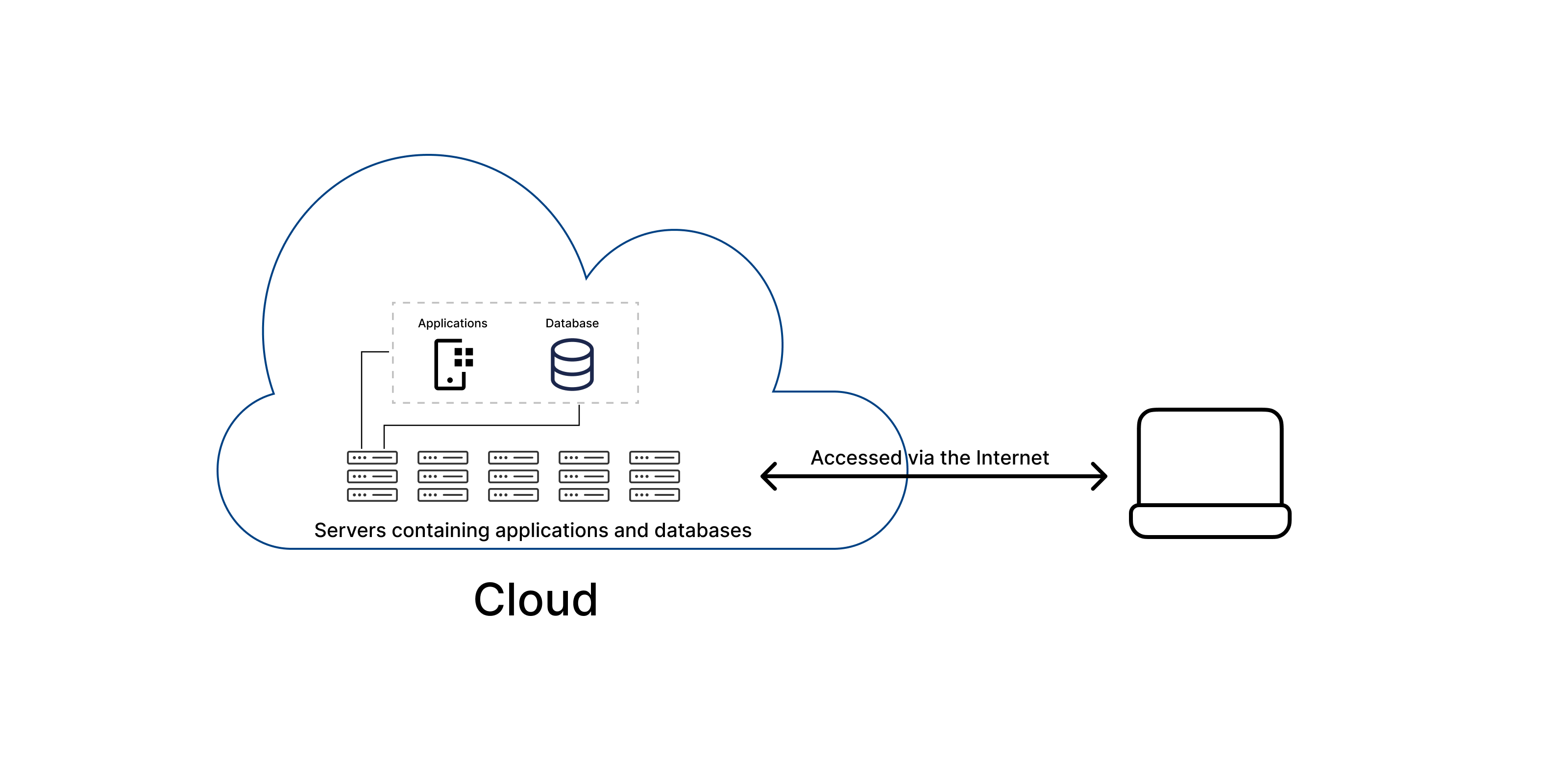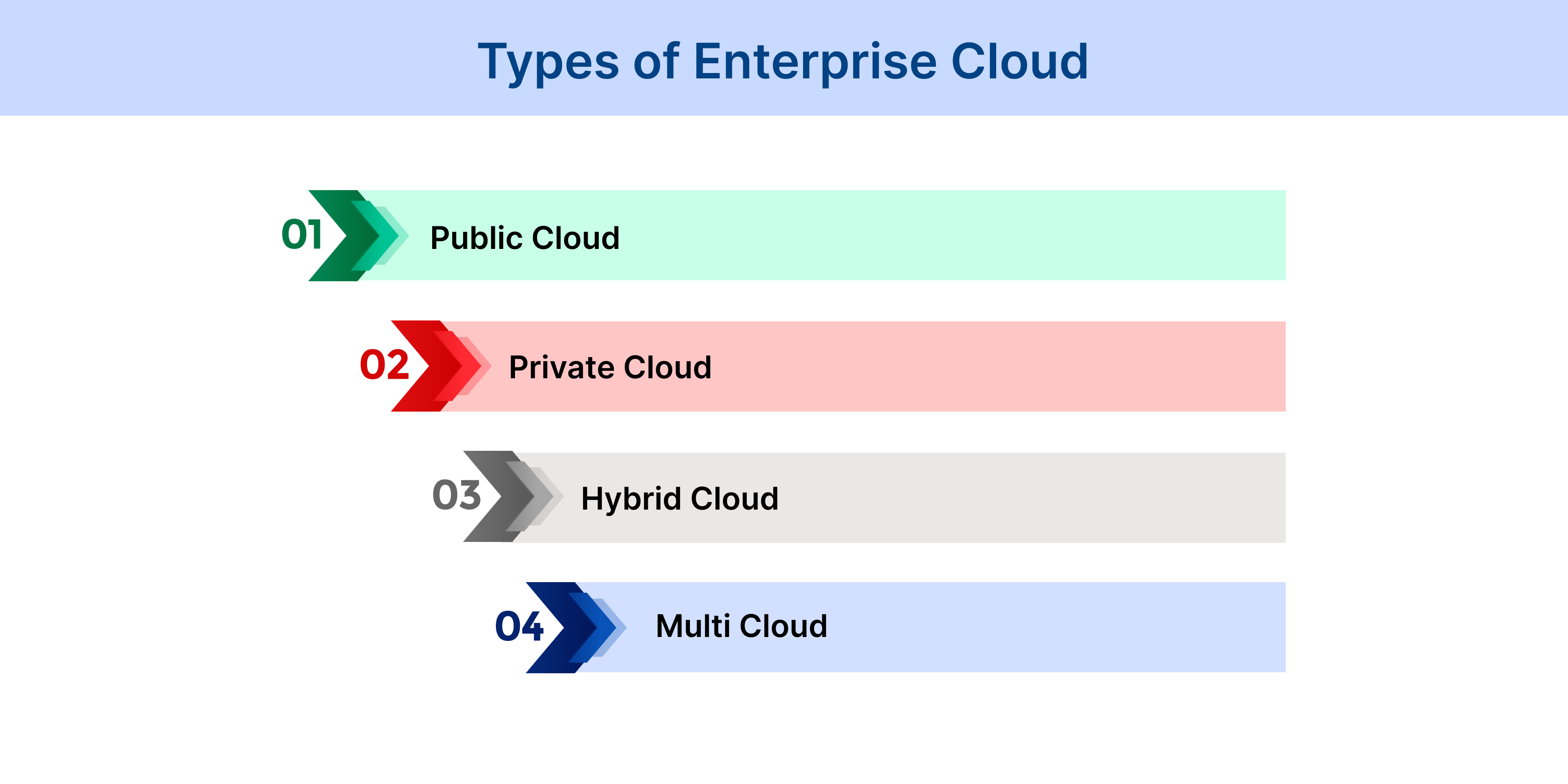What is Enterprise Cloud Computing and What Are Its Advantages?
Introduction
Enterprise cloud computing is a way for large businesses to use cloud technology tailored specifically for their complex needs. Unlike regular cloud computing, which can be used by anyone, enterprise cloud computing is designed to handle the big data, security, and regulatory requirements that large organizations face. It allows businesses to store data, run applications, and scale their operations without needing to manage physical hardware.
This flexibility helps companies reduce costs, improve efficiency, and stay competitive in a fast-changing market. In this blog, we'll explore what enterprise cloud computing is, how it differs from standard cloud computing, its benefits, challenges, and real-world examples of how it's being used.
What is the definition of Enterprise Cloud Computing?
Enterprise cloud computing is the use of cloud computing technology specifically tailored to meet the complex, large-scale needs of businesses and organizations. It involves leveraging cloud services such as data storage, computing power, and applications in a way that supports the scalability, security, and regulatory compliance requirements of an enterprise. This enables businesses to manage their IT resources more efficiently while maintaining control over their data and operations.

What are the Different Types of Enterprise Cloud Architecture?
Enterprise cloud architecture can be categorized into four main types: public, private, multi-cloud, and hybrid cloud. Each type serves different business needs and offers unique benefits depending on the organization's goals and requirements.

Public Cloud
The public cloud is a cloud computing model where services like storage, applications, and computing power are provided over the internet by third-party providers. These resources are shared among multiple users or organizations, making it a cost-effective and scalable solution. Companies that choose public cloud architecture can easily scale their resources up or down depending on their needs without worrying about managing the underlying infrastructure.
Public clouds are ideal for businesses that need to deploy applications quickly and do not have strict regulatory or security requirements. Providers like Amazon Web Services (AWS), Microsoft Azure, and Google Cloud Platform are popular choices for public cloud services.
Private Cloud
Private cloud architecture is dedicated solely to one organization. Unlike public clouds, the infrastructure in a private cloud is not shared with other users. This can be hosted either on-premises within the company’s own data center or by a third-party service provider. Private clouds offer more control over the IT environment, making them suitable for organizations with strict security, compliance, or performance requirements.
Companies that need to handle sensitive data or must comply with stringent industry regulations often opt for a private cloud to ensure that their data is secure and accessible only to authorized users.
Multi-Cloud
Multi-cloud architecture involves using cloud services from multiple providers. Instead of relying on a single cloud provider, a company might use a combination of public and private clouds, or multiple public clouds, depending on the specific needs of different applications and workloads. The multi-cloud approach allows businesses to avoid vendor lock-in, optimize costs, and choose the best tools and services from various providers.
For example, a company might use one cloud provider for data storage, another for machine learning applications, and yet another for backup and disaster recovery. This flexibility ensures that businesses can select the best solutions for their needs while spreading risk across different platforms.
Hybrid Cloud
Hybrid cloud architecture combines elements of both public and private clouds, allowing organizations to take advantage of both. In a hybrid cloud setup, businesses can keep sensitive data and critical applications in a private cloud while leveraging the scalability and cost benefits of a public cloud for less-sensitive operations. This model provides the best of both worlds, offering flexibility, scalability, and enhanced security.
For example, a company might run its core operations in a private cloud but use a public cloud for additional capacity during peak times or for disaster recovery purposes. Hybrid cloud is particularly beneficial for businesses that need to balance security with the ability to scale their operations quickly.
Each of these cloud architectures serves different business needs, and the choice of which to use depends on factors like the organization's size, industry, security requirements, and specific business goals.
Difference Between Enterprise Cloud Computing and Cloud Computing
This table highlights the key differences between enterprise cloud computing, which is tailored for large, complex organizations, and general cloud computing, which is designed for a broader audience with more standard needs.
Why Would a Company Go for Enterprise Cloud Computing?
There are several compelling reasons why a company might choose enterprise cloud computing:
Scalability: Enterprise cloud computing allows organizations to scale their IT resources up or down based on demand, without the need for significant capital investment in hardware.
Cost Efficiency: By moving to the cloud, companies can reduce the costs associated with maintaining on-premises infrastructure, such as hardware, software, and staffing.
Flexibility: Enterprise cloud computing offers the flexibility to deploy and manage applications across different environments (public, private, hybrid, or multi-cloud), enabling businesses to choose the best model for their needs.
Security and Compliance: Enterprise cloud providers offer advanced security features and compliance certifications, helping organizations protect sensitive data and meet regulatory requirements.
Business Continuity: Cloud services ensure that businesses can maintain operations even in the event of a disaster, thanks to data redundancy and backup options.
Innovation: Cloud computing provides access to cutting-edge technologies like artificial intelligence, machine learning, and big data analytics, enabling organizations to innovate and stay competitive.
Advantages of Enterprise Cloud Computing
Cost Savings: Reduces the need for physical infrastructure, thereby lowering capital expenditures. Operational costs are also minimized as companies pay only for the resources they use.
Scalability and Flexibility: Allows businesses to easily scale their resources based on demand, ensuring they can handle peak loads without over-investing in infrastructure.
Enhanced Security: Offers robust security measures, including encryption, access controls, and compliance with industry standards.
Improved Collaboration: Enables teams across different locations to collaborate seamlessly by accessing shared applications and data in the cloud.
Disaster Recovery: Provides built-in disaster recovery solutions, ensuring that critical business data is backed up and can be restored quickly in case of an emergency.
Faster Time to Market: Speeds up the deployment of new applications and services, allowing businesses to respond more quickly to market changes.
Disadvantages of Enterprise Cloud Computing
High Initial Setup Costs: While operational costs may be lower, the initial setup and migration to the cloud can be expensive, especially for large organizations with complex IT environments.
Security Concerns: Although cloud providers offer advanced security features, storing sensitive data in the cloud can still pose risks, especially if not managed properly.
Compliance Issues: Meeting regulatory requirements can be challenging in the cloud, particularly for businesses in highly regulated industries like finance and healthcare.
Dependency on Internet Connectivity: Cloud services rely on internet connectivity. Any disruption in the connection can impact access to critical applications and data.
Vendor Lock-In: Organizations may become dependent on a single cloud provider, making it difficult and costly to switch providers or move data back on-premises.
Use Case of Enterprise Cloud Computing
A leading financial services company, for example, might use enterprise cloud computing to streamline its operations, enhance security, and comply with regulatory requirements. By adopting a hybrid cloud model, the company can keep sensitive customer data in a private cloud while leveraging the scalability and cost-effectiveness of the public cloud for less sensitive operations.
This approach not only optimizes costs but also ensures that the company can quickly respond to market changes, launch new services, and maintain a high level of security and compliance.
Examples of Companies Utilizing Enterprise Cloud
Here are some well-known companies that utilize enterprise cloud computing to support their large-scale operations:
Netflix - Uses Amazon Web Services (AWS) to manage its massive streaming service, ensuring high availability and scalability for millions of global users.
General Electric (GE) - Leverages a hybrid cloud strategy to manage its industrial Internet of Things (IoT) operations, connecting various business units and improving efficiency.
Capital One - Utilizes cloud computing to enhance its banking services, providing customers with secure and reliable financial products.
Spotify - Uses Google Cloud Platform (GCP) to store and manage its vast music library, ensuring smooth streaming and personalized user experiences.
Airbnb - Relies on AWS for scalability and flexibility, enabling the platform to handle millions of transactions and listings worldwide.
Unilever - Employs a multi-cloud strategy using Microsoft Azure and AWS to drive innovation, improve customer engagement, and streamline global operations.
Walmart - Utilizes a combination of private and public cloud services to manage its vast retail operations, optimize supply chain processes, and enhance customer experiences.
BMW - Uses Microsoft Azure for its connected car initiatives and digital services, providing a seamless driving experience for customers.
Coca-Cola - Leverages the cloud for data analytics, supply chain management, and customer engagement, improving efficiency and decision-making processes.
Shell - Utilizes a multi-cloud strategy, including AWS and Microsoft Azure, to support its global energy operations, from exploration to retail.
These companies demonstrate the diverse ways in which enterprise cloud computing is being used to drive innovation, improve efficiency, and enhance customer experiences across different industries.
Frequently Asked Questions (FAQ)
Conclusion
Enterprise cloud computing is transforming the way large organizations operate, offering a range of benefits, from cost savings to enhanced security and scalability. However, it’s not without its challenges, such as security concerns and potential vendor lock-in. By carefully evaluating their needs and choosing the right cloud architecture, businesses can leverage the power of the cloud to drive innovation, improve efficiency, and stay competitive in today’s fast-paced market.
As cloud computing continues to evolve, enterprises that adapt and optimize their cloud strategies will be better positioned to succeed in the digital age. Whether through public, private, hybrid, or multi-cloud solutions, the future of enterprise IT lies in the cloud.
